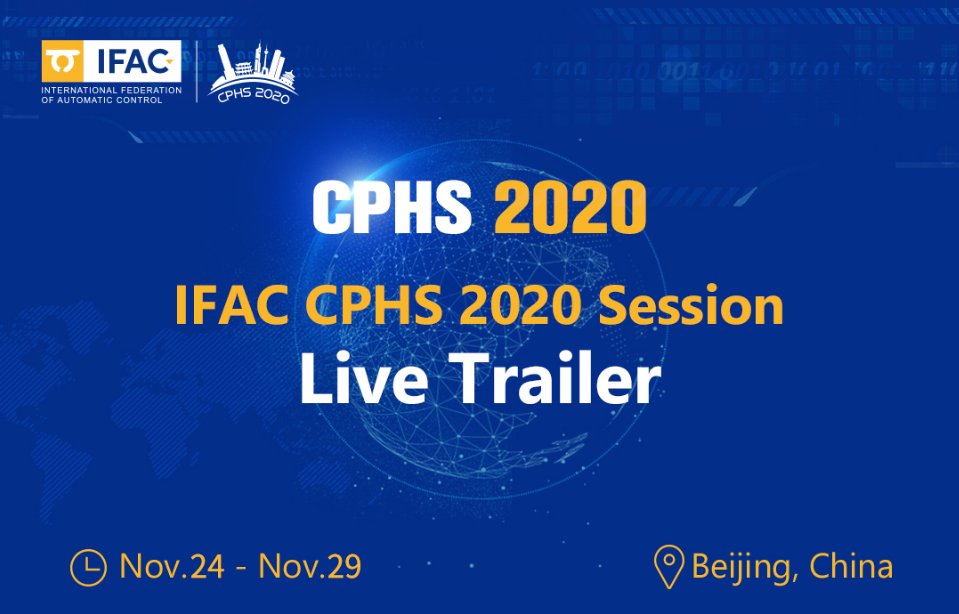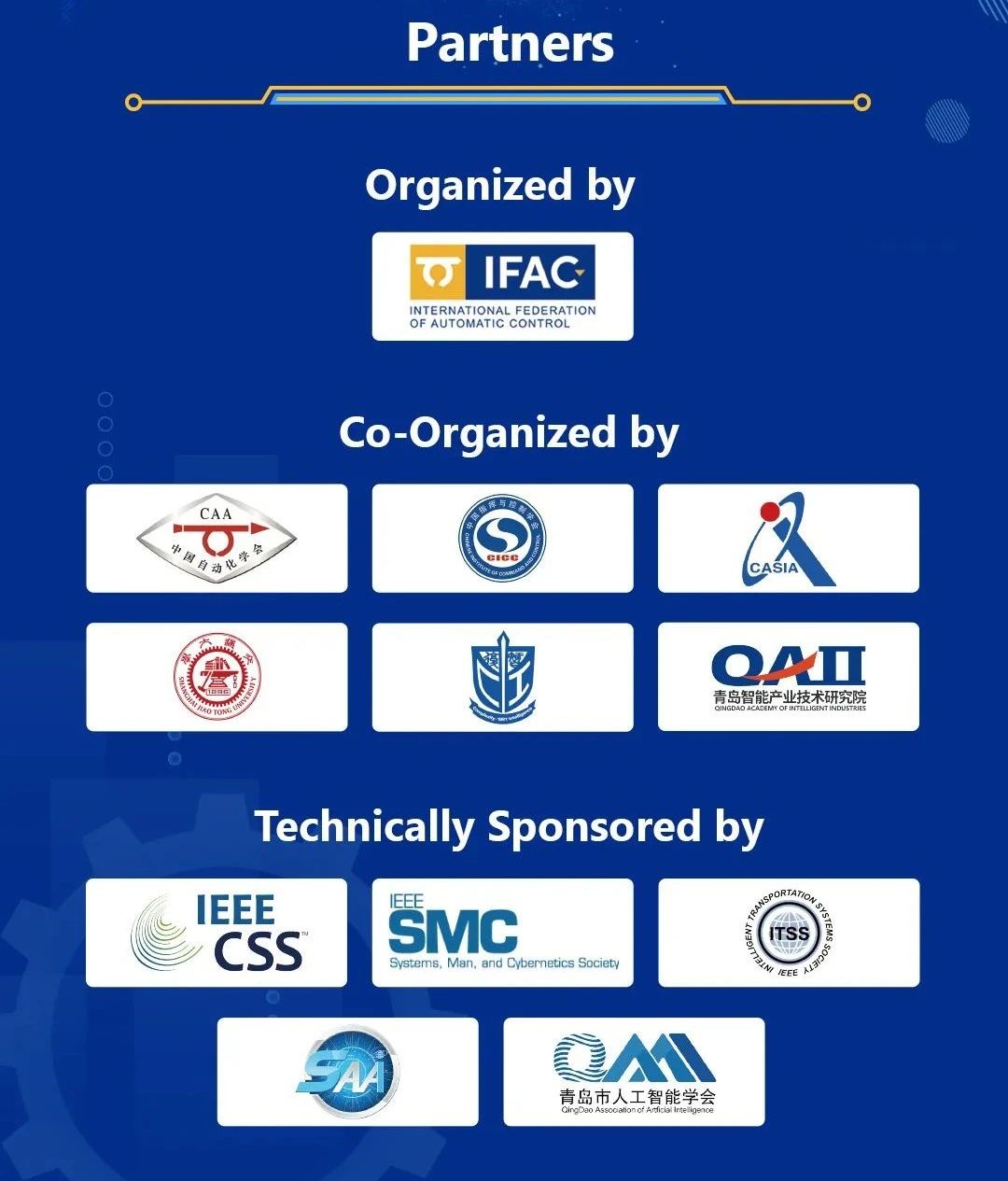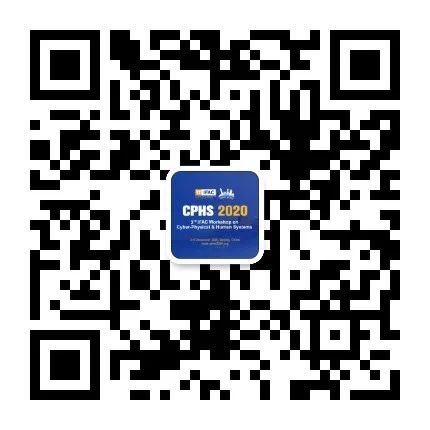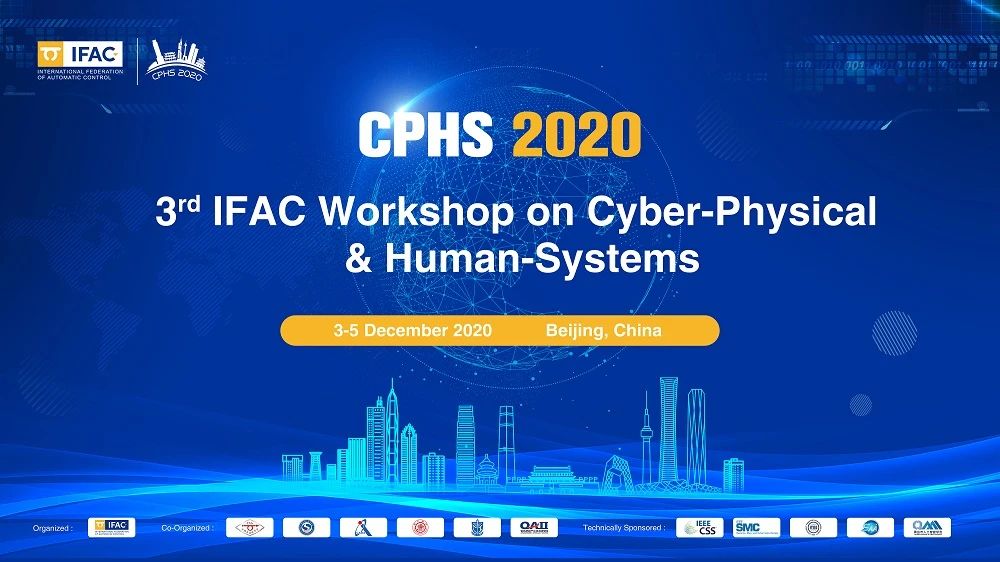2020年12月3日-5日,第三届IFAC CPHS研讨会将在中国北京召开,本次会议由国际自动控制联合会(IFAC)与中国自动化学会(CAA)共同主办,致力于探寻自动化领域人机物混合智能系统的新一轮发展浪潮。会议采用线上线下相结合的形式。现将本周会议直播汇总,欢迎各位专家学者、科研从业者及学生在线参会!

Nov.24(CST,UTC+08:00)
Time:14:00-16:00
Title:
Parallel City and The Development of Software Based on the Ternary Space of Human, Machine and Object
Proposers:
Xiaodong Zhang,Yu Zhang,Yisheng Lv,Xin Peng,Zhigang Li,Fenghua Zhu
Introduction:
The convergence and integration of the Internet and other kinds of networks (including telecommunication networks, mobile networks, Internet of things, etc.) will continue to promote the deep integration of human society, information space and the physical world. The fusion of human, machine and object comes along with correspondingly technological challenges when addressing software development issues. The development of software needs to extend the classical software modeling and execution methods based on data flow, control flow and state space from human centered to the ternary space of human, machine and object, so as to realize cross boundary and intelligent resource arrangement and fusion. The goal of this special session is to discuss latest research findings and engineering experiences in developing and applying software based on the ternary space of human, machine and object.
Urban systems, as one of the most complex man-made systems, face a number of complicated and cost/time/space-critical tasks. Parallel City, an emerging field and paradigm of urban management and control, is based on Cyber-Physical-Social Systems (CPSS). The parallel city is an application of ACP-based parallel intelligence in city fields. The real city is running with its equivalent, the artificial city in virtual space, in a parallel and interactive way. The artificial city has the descriptive, predictive, and prescriptive functions on the real city. There is a closed-loop workflow between the real city and the artificial city, which iteratively optimize the urban systems, leading to a new paradigm of intelligent urban management.
The goal of this session is to encourage researchers and practitioners to handle these tasks more effectively by introducing CPSS-based parallel city, which can make a better use of the new ICT technologies.
Nov.25(CST,UTC+08:00)
Time:14:00-16:00
Title:
Analysis, optimization & control of structural flexible systems in CPHS
Proposers:
Bo Zhao, Fang Xu, Zhijie Liu, Yancai Xu
Introduction:
As a typical kind of CPHS, the structural flexible systems including robots, industrial manipulators, helicopters, ground, surface or underwater vehicles, are expected to operate in smart, convenient and smooth manners. Moreover, the utility of structural flexible systems critically depends on the level of intelligence. Thus, this brings incremental challenges in decision-making, path-following, state estimation, trajectory tracking, function evolution and prediction, environment learning, etc. Great efforts need to be made to analyze, optimize and control such systems from both theoretical and practical points of view. This special session aims to share most recent developments on analysis, optimization and control of structural flexible systems.
Time:18:00-20:00
Title:
Social Transportation in the New Era of Intelligent Transportation Systems (ITS) + Transportation 5.0 in the Cyber-Physical-Social Space + Cognitive Urban Autonomous Driving
Proposers:
Xiaoxiang Na,Yimin Chen,Wenshuo Wang,Dongpu Cao,Lingxi Li,Shengbo Li,Yisheng Lv,Fenghua Zhu,Junchen Jin,Xiao Wang,Yuanyuan Chen
Introduction:
The ubiquity of mobile communication devices and the prosperity of location-based services are turning people and devices into ubiquitous social sensors for transportation. However, designing approaches and tools to leverage comprehensive social media and crowdsourcing data to enable intelligent transportation brings a unique set of research and engineering challenges. Social transportation is the study of how these changing research and engineering challenges lead to new explorations into intelligent transportation systems. Social transportation extends intelligent transportation to the cyber-physical-social system context and aims to empower traffic and transportation systems with insights and decisions derived from real-time social and physical data. The goal of this session is to provide a forum to exchange ideas, discuss solutions, and share experiences from industry, researchers and the public sector.
Transportation 5.0, an emerging field of transportation research and applications, is based on Cyber-Physical-Social Systems (CPSS). Transportation systems, as one of the most complex man-made systems, face a number of complicated and cost/time/space-critical tasks. The goal of this session is to encourage researchers and practitioners to handle these tasks more effectively by introducing CPSS-based ITS, which can make a better use of the pervasive real-time social and physical signals. The main idea is to apply the CPSS-based ITS technologies to conduct traffic planning, assignment, navigation, management, control and transportation analytics with lower cost, higher accuracy, faster speed, more agility, and full responses.
Nov.26(CST,UTC+08:00)
Time:18:00-20:00
Title:
Control for Smart Cities + Sensing and Data-driven Decision Making in Cyber-Social Space
Proposer:
QingShan Jia
Introduction:
The recent technology advances in Internet-of-Things, big data, and cloud computing has provided opportunities for making cities smarter. Examples include but are not limited to smart buildings, intelligent transportation systems, and smart grid. This session intends to introduce the state-of-art in this field, about the modeling, simulation, and optimization of various aspects in smart cities.
Nov.27(CST,UTC+08:00)
Time:08:00-10:00
Title:
Theory development of CPHS and applications on Mechatronic Systems & Human-Centered Automated Driving
Proposers:
Hui Zhang,Yang Xing
Introduction:
This special session consists with two parts: The first part is focused on theory development of CPHS and applications on mechatronic systems. Potential topics include:
Analysis and modeling of CPHS;
Model predictive control of CPHS;
Robust and adaptive control of CPHS;
Application on autonomous vehicles;
Application on marine systems;
Application on robotics;
Application on micro-grid systems.
The second part aims to provide up-to-date research concepts, theoretical findings, and practical solutions that could help advance the human centered automated driving vehicles. Topics of interest include, but are not limited to:
1) Human-automation collaboration and interaction;
2) Mutual understanding between human and automation;
3) Human factors in automated driving vehicles;
4) Shared control and Authority transition control;
5) Human-machine interface design
6) Drivers’ acceptability of, preference for, and adaption to vehicle automation;
7) Machine learning methods for human-centered automated vehicles;
8) Testing, verification, and evaluation for automated vehicles;
9) Connected and automated vehicle technologies;
10) Policies, roles, and eco-system design for next-generation automated driving.
Time:10:00-12:00
Title:
Learning and Self-Learning Designs for Cyber-Physical and Human Systems
Proposers:
Qinglai Wei,Ruizhuo Song
Introduction:
Learning are always playing an important role in artificial intelligence for cyber-physical and human systems. Through the recent years, novel learning and self-learning approaches have been developed, such as adaptive dynamic programming (ADP) and reinforcement learning (RL) approaches, which make it more intelligent to find the optimal policies for cyber-physical and human systems. They are able to efficiently solve the optimal and resilient designs without knowing the mathematical system model, which are suitable to find the optimal policy for complex systems in control engineering, artificial intelligence, and even economy. This special session will provide a forum to deliver and discuss original research results and new techniques in learning and self-learning designs for cyber-physical and human systems and drive its further development in this field.
Time:14:00-16:00
Title:
DevOps for Machine Learning driven Social Systems
Proposers:
Qinghua Lu,Weishan Zhang
Introduction:
Machine learning (ML) has gained much attention in recent years because of its successful adoptions in many data rich domains, including social systems.
However, the development of ML-driven systems in real-world settings is non-trivial and several scientific challenges are encountered in practice during development, debugging, maintenance, deployment and governance of ML systems. On one hand, the development lifestyle of data-driven and ML-driven systems differs from that of traditional software systems. Previous software engineering tools and practices may be not applicable to the development of ML-driven systems. On the other hand, risks of incorporation of ML in software system development have been increasingly concerned due to dataset/model quality risk and DevOps challenges in ML driven systems. New methods are needed to ensure ML development and operation is conducted in a trustworthy manner. Although some research efforts have been made on software engineering for ML-driven social systems, there is still a need for more comprehensive DevOps theoretical approaches and tooling support for ML-driven social systems. This special session aims at presenting cutting edge technologies, novel studies, and promising developments, which can improve DevOps of ML-driven social systems.
Nov.29(CST,UTC+08:00)
Time:10:00-12:00
Title:
Digital Twins in Industries
Proposer:
Quan Hu
Introduction:
In the past 10 years, Digital Twin grew into an independent industry from a concept coined by DARPA. Digital Twin is considered to be a new General-Purpose Technologies (GPT), which means that it can be used in a broad range of industries, such as manufacturing, oil and gas, cities, energy management, vehicles, aeronautics and astronautics, etc. The special session focuses on innovative digital twin technologies, data-driven paradigm, digital twin platform, and applications, and it is one of the witnesses at the inception of the second 10 years of Digital Twin era.

Looking forward to seeing you on live.


